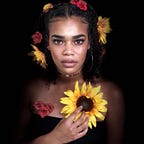Is this beautiful?
The summer before 11th grade, I lost my voice. My vocal chords still rubbed together to produce sound, but my inner voice was gone. I was consumed by the desire to make a single person happy — trying to be as pretty as he wished, being on call for him 24/7, even if it meant sacrificing sleep, money, time, and energy for his happiness in place of mine. School and violin always made me happy, but when he criticized me — You’re a nerd, Stop being so smart, or Stop playing the violin, it’s lame — it was hard to keep my head up. Because what if my peers saw me that way too? I’d always heard that relationships were supposed to be about lifting each other up, so I was embarrassed that my relationship wasn’t. And I pretended because I thought that’s what people wanted to see.
I was tempted to stay in this toxic relationship because I felt like there was nobody to confide in. Growing up in my school, I didn’t feel pretty because, in a sea of white, who would consider black? That’s not beautiful. Right?
I felt like my teachers couldn’t empathize with the experience of a young black woman. Day after day, I’d go through the motions, a single thought drumming in my head:
“What is so wrong with me?”
I didn’t eat, I didn’t sleep, and my grades plummeted. When I finally broke off the relationship, I thought my problem was over. But it wasn’t. The negative self-talk persisted. Months after the relationship ended, the thought still lingered:
“What is so wrong with me?”
Then I met Janie. Janie was my confidant. I could connect with her and look up to her because she was just like me — a young, mixed-race woman trying to navigate toxic relationships in a world that didn’t appreciate her. Janie taught me to reclaim my voice and to appreciate myself for the powerful things I can do. Just as my ex-boyfriend had done to me, Janie’s first husband pretended to love her and treated her as if nobody else would want her. So she left. Her second husband, out of jealousy, made her cover her gorgeous hair and shamed her for expressing her opinion. For me, trying to start a conversation about a recent social justice issue or Awkwafina, my favorite underground female rapper, was impossible. I was shut down at any hint of my enthusiasm. As soon as Janie found the person who would listen to her and value her as an equal, she knew she had found true companionship. Seeing her achieve fulfillment made me recognize what I deserved. Janie taught me how to be my own caring, authentic, unstoppable, fearless woman, and how to separate my needs from others’ expectations. Janie taught me how to let my hair down again.
Here’s the thing about Janie. I met her in a book. Zora Neale Hurston created her, it seemed, just for me. Their Eyes Were Watching God turned my life around. Now, I approach all my relationships — platonic, familial, professional — with a delicate balance between making my voice heard and listening to others. Intellectual conversations and the notes of Tchaikovsky are just as worthy as the newest NBA 2K release. Poring over Langston Hughes, Maya Angelou, and Emily Dickinson is just as hip as knowing all the words to the newest 21 Savage song. I don’t have to always set aside my happiness and feelings to accommodate others. I don’t have to suppress my intellect to make others feel bigger. Speaking my truth, authentically, will ensure my own true, healthy happiness.
Austin Fitzgerald is a first-year student at the University of Chicago. She is planning to major in Anthropology while following the Pre-Health track. Originally from Charlotte, NC, she founded a non-profit called MindStrings which offers free violin lessons and orchestral support to under-resourced schools in an effort to address the social and economic mobility issue in her city and hopes to expand to Chicago. She also has served as a leader for her high school’s diversity club in addition to attending the 2015 Student Diversity Leadership Conference and helping plan and facilitate the annual Affirming Community Together Conference for Charlotte Area middle schools to learn about diversity and social justice.
